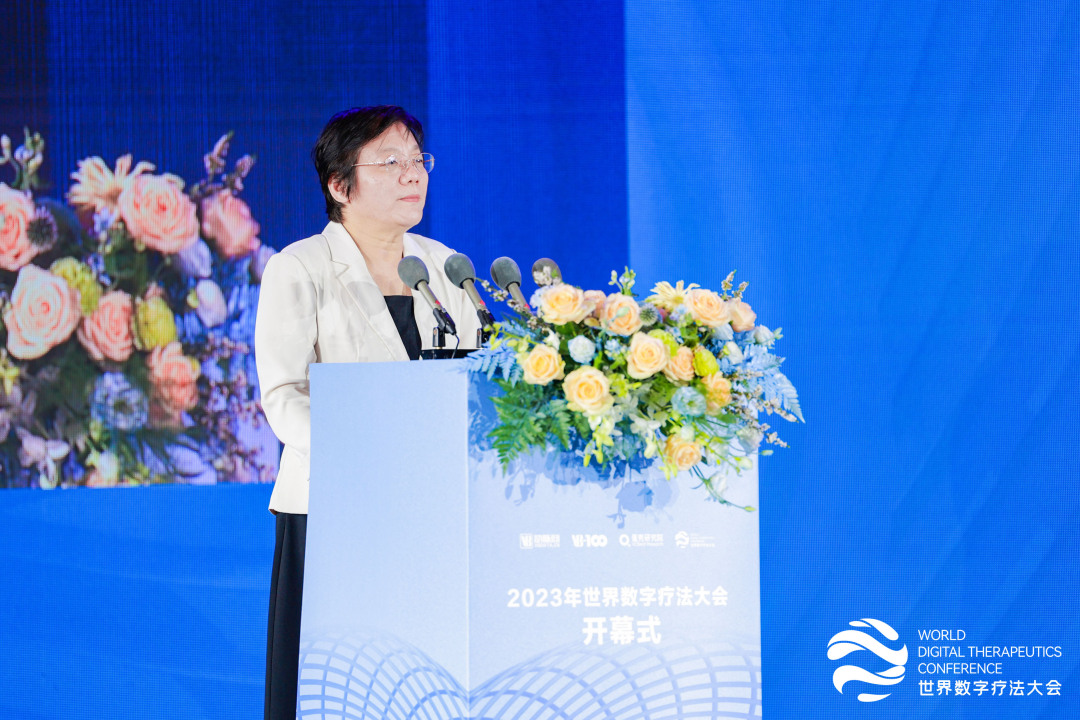预约演示
更新于:2025-09-30

Beijing Wujiang Brain Technology Co., Ltd.
更新于:2025-09-30
概览
关联
100 项与 北京无疆脑智科技有限公司 相关的临床结果
登录后查看更多信息
0 项与 北京无疆脑智科技有限公司 相关的专利(医药)
登录后查看更多信息
1
项与 北京无疆脑智科技有限公司 相关的新闻(医药)2023-09-05
·生物谷
2023年8月26日,由北京蛋黄科技有限公司主办,重庆动脉橙科技有限公司、海南蛋黄科技有限公司承办,中国医疗器械行业协会数字疗法专委会、英国商业贸易部、澳大利亚贸易投资委员会支持,阿斯利康投资(中国)
2023年8月26日,由北京蛋黄科技有限公司主办,重庆动脉橙科技有限公司、海南蛋黄科技有限公司承办,中国医疗器械行业协会数字疗法专委会、英国商业贸易部、澳大利亚贸易投资委员会支持,阿斯利康投资(中国)有限公司、海南生态软件园战略合作的2023年世界数字疗法大会在海南海口鲁能希尔顿酒店圆满落幕。
大会以“领航产业生态新未来,共建人类卫生健康共同体”为主题,分别设立了“未来健康体系与人类卫生健康共同体”、“数字疗法与肿瘤”、“数字疗法与慢病管理”、“数字疗法与脑科学与认知神经科学”、“数字疗法与全球创新产业生态”五大主论坛,吸引国内外院士、跨国药械/国内头部医疗企业高管、上市企业CEO、知名专家学者、创新企业及省数字疗法产业工作专班成员单位、医疗机构/高校代表等众多嘉宾代表参会,共商共建共享全球数字疗法的发展方向、探讨数字疗法在具体医疗场景的可能性,挖掘其更大的市场潜力。
01. 乘风而上,数字疗法大有可为
8月25日开幕式上,海南省人民政府副省长谢京,国家卫生健康委党组成员、副主任于学军,中国工程院院士、内分泌代谢病学专家宁光出席会议并致辞。谢京副省长在开场致辞中表示,希望海南能与各方携手合作,共同开拓数字疗法的新道路、新理论、新规则,为将海南建设成为全球数字疗法创新岛、创新资源集聚区和产业高地而共同奋进。于学军副主任在致辞中表示,世界各国高度重视卫生健康与信息技术的融合发展,数字健康已经成为促进卫生健康事业发展的重要支撑,而数字疗法正是数字健康的重要内容。宁光院士在致辞中表示,数字疗法能通过技术手段打通独立的数字医疗的数据孤岛,实现患者全生命周期的健康管理,推进智能化的健康管理生态体系的建立。
海南省卫生健康委党委委员、副主任张毓辉以《海南乘风——全球数字疗法创新岛建设进展》为主题作主旨报告,全方位地阐述了海南近两年基于数字疗法产业的推进速度,以及对于产业未来发展的思考。他表示,目前,国内越来越多的地方已经开始大力支持数字疗法,海南作为数字疗法产业发展的引领者,将不断跑出更快的自贸港加速度,持续保持数字疗法发展的领先地位。
对此,包括《数字疗法海南倡议》、《2023数字疗法白皮书》、“2023年世界数字疗法大会最佳创新及实践企业”颁奖仪式以及“海南数字疗法创新应用场景与解决方案落地仪式”等多项仪式均在此次大会中顺利举行,全方位地彰显了海南发展数字疗法产业的决心和信心及丰硕成果。
据悉,《数字疗法海南倡议》由海南省卫生健康委员会党委书记、主任周长强主任领衔多位院士专家共同发布,倡议共15条,意味着海南将联合多方核心力量,全力加快海南数字疗法创新岛建设。
(数字疗法海南倡议)
“2023世界数字疗法最佳创新及实践企业评选”是本次大会的同期活动,评选立足数字疗法创新及实践生态,面向全球数字疗法企业展开评选,集中寻找数字疗法领域的未来力量,为海南数字疗法产业更坚实发展增添更多活力。入选企业包括ALSOLIFE、IBT无疆科技、Luca Healthcare、冰片科技、博斯腾、道博医疗、恩启、格致健康、和家健脑、京东健康、睛采智能、鹿鸣健康、脑动极光、凝动医疗、诠视科技、森梅医疗、尚医信息科技、视景医疗、速眠科技、望里科技、小南听说、心景科技、虚之实科技、医渡科技、暂停实验室、正岸健康、芝兰健康、织生科技、智众医疗、众曦医疗科技(音序排列,不分先后)完整榜单请阅读查看数字疗法TOP30|2023年世界数字疗法大会最佳创新及实践企业揭晓
(2023年世界数字疗法大会最佳创新及实践企业揭晓)
“海南数字疗法创新应用场景与解决方案落地仪式”是海南开始实质性、系统性地推动数字疗法落地的有力表现,其中北京京师脑科学研究院有限公司、厦门市和家健脑智能科技有限公司入选2023年海南数字疗法为民办实事项目——老年人认知康复数字疗法试点,上海智众医疗科技有限公司、苏州医朵云信息科技有限公司、天津微医数字医院有限公司、医渡云(海南)科技有限公司入选2023年海南省全面实施的“2+3”健康服务包项目。仪式见证了入选两个项目的6家数字疗法创新企业在海南的落地、成长,并将为海南数字疗法解决方案贡献力量。
在隆重的开幕启动仪式后,中国工程院院士樊代明、2013年诺贝尔生理学或医学奖获得者Thomas C. Südhof和蛋壳研究院院长姜天骄分别就《数字医疗发展的整合与转向》、《How is 'Digital' Changing Biomedical Research and Drug Development?》与《数字疗法:大时代,大机遇,大变革》进行了主题演讲,樊代明院士表示数字医疗是医学发展的必然趋势,面对人口老龄化和慢性病等难题,数字医疗可以发挥独特作用。中国抗癌协会制定肿瘤诊疗指南,并以数字方式推广应用的实例,取得了显著成效。同时数字医疗是医学发展的大势所趋,中国正在这一领域处于世界前沿。Thomas C. Südhof主张数字技术可对数据进行深度学习,揭示生命奥秘,推动医学研究进步。虽然数字技术为生物医学研究带来了巨大机遇,但也存在数据质量、商业化学术出版等问题,对此需要科学界共同努力,合理利用数字技术,从根本上提高研究质量。姜天骄先生认为数字疗法通过认知和行为干预产生下游生物学效应,临床价值取决于认知行为对疾病的重要性。当前商业化面临渗透率不高、单价偏低的挑战,需要通过提升定价、扩大覆盖人群规模进行突破。面对质疑,应看清数字疗法发展趋势,相信其背后的患者需求,坚定产业发展信心。
02. 当医学遇见数字技术,一场深度融合拉开序幕
近年来,数字疗法在全球范围内高速发展,其赋能医疗产业各领域的巨大价值日益彰显,从正在推进临床试验的产品管线观察,其已覆盖弱视、自闭症、阿尔茨海默症、睡眠障碍、抑郁焦虑等种类繁多的疾病领域。随着数字疗法产业多样化进程推进,数字疗法企业也在寻找共性发展机遇,作为医疗行业生态圈的新增量,也面临着机遇与挑战共存的局面。由此,大会也从政策牵引、细分赛道技术推进及产品研发、产业生态及创新商业化解析等层面试图全面探索数字疗法产业创新发展的下一站。
携手共建人类卫生健康共同体
疾病不分地域和国家,人类是同舟共济的命运共同体。人类与疾病抗争史告诉我们,在疾病面前,各国利益休戚相关、命运紧密相连,唯有增强国际交流与合作,凝聚各国力量,才能最大限度地保护人民的生命安全,实现国家的持续健康发展。8月25日下午主论坛之未来健康体系与人类卫生健康共同体暨2023年中国卫生经济青年学术交流会从全球宏观视角围绕就亚洲引领全球健康、卫生服务体系构建、人类卫生健康共同体理念趋势、数字疗法对健康体系的战略意义等话题展开深入探讨。出席论坛的专家,包括中国卫生经济学会青年卫生经济委员会主任委员张毓辉,香港大学教授、原世界卫生经济大会主席David Bishai,北京大学中国卫生发展研究中心执行主任、海南健康发展研究院院长孟庆跃,哈尔滨医科大学教授刘国祥,国家卫生健康委卫生发展研究中心研究员王云屏,动脉网创始人李大韬。
David Bishai教授主张亚洲国家加强公共卫生合作,培养人才,开展高质量研究,与国际组织合作,推动建立亚洲公共卫生合作机制,扩大亚洲在全球卫生领域的影响力。孟庆跃主任表示要推进医疗卫生体系改革,实现以人为本,通过制度创新改变资金使用目标,满足人民健康需求。刘国祥教授提出整合资源服务,实行按病种付费并设计绩效激励,通过监管考核建立有效经济运行机制。王云屏研究员指出共建人类卫生健康共同体需要全球团结合作,构建安全、发展、创新等共同体,并提升发展中国家话语权。李大韬先生认为医疗健康产业处于数字化变革期,数字医疗成为新兴方向,未来医疗创新可能以中国为主导。张毓辉主任认为数字疗法是医疗健康领域的关键技术和模式创新,能够直接干预健康和疾病,解决当前医疗面临的不可能三角困境。中国应利用市场和科技实力,通过政策创新快速孕育数字经济产业,以数字疗法引领健康事业双赢升级,为构建人类卫生健康共同体贡献力量。
数字化助力肿瘤临床诊疗变革
数字疗法一方面可以改善肿瘤患者在精准治疗背景下,对用药规范的认知,另一方面可改善患者看病难、就医远的问题,提高院外随访、复查复诊的粘性,从而提升其生存获益。8月25日下午主论坛之数字疗法与肿瘤从药物研发的临床研究、治疗方案改善、全病程管理实践等内容进行深入对话。出席论坛的嘉宾,包括上海长征医院肿瘤内科教授、主任医师王杰军,北京大学人民医院I期临床试验研究室主任方翼,上海市肿瘤研究所副所长刘培峰,中国医学科学院肿瘤医院GCP中心副主任医师、伦理总监吴大维,武田制药全球高级副总裁、武田中国总裁单国洪,Elsevier大中华区首席医学官、美国纽约大学医学院博士姚怡心,爱楷医疗CEO朱伟,华兴资本医疗与生命科技事业部董事贾妍(主持人)。
(主论坛之数字疗法与肿瘤的嘉宾)
王杰军教授认为数字疗法可以实现医疗资源下沉,帮助解决肿瘤患者在院内外全过程管理中的问题,还可促进临床研究和提高患者依从性,实现多方共赢。方翼教授分享到,临床试验发现新药可通过调节性T细胞和效应性T细胞的平衡,可持续治疗类风湿关节炎等自身免疫病,建议利用数字医疗大数据做多中心研究,并探索中药调节免疫潜力。刘培峰副所长总结了核酸药物开发的最新进展,期望业内共同推动数字化核酸药物创新,提高肿瘤患者生存率。吴大维副主任分享了数字化医疗技术在肿瘤临床研究中的应用,并指出数字化技术在肿瘤临床研究应用中的特点是暂时不具备完全数字化基础,多采用混合模式。单国洪先生表示,近年来武田中国积极拥抱医药健康领域的数字化趋势,不断探索创新技术解决方案推动加速患者获益,其中非常具有代表性的举措便是推出了国内首个且唯一获得国家药品监督管理局批准上市的重组FVIII剂量指导软件——myPKFiT。姚怡心女士介绍目前医院通过制定临床诊疗路径来应对医保改革,人工智能可以在肿瘤诊疗各环节发挥作用。谈及爱楷医疗的产品设计,朱伟先生强调了基于大量的科学研究和循证验证、基于循证的认知行为干预知识体系、基于循证的治疗流程三个方面。
数字疗法打造智慧慢病管理新模式
相较于以往传统的慢病管理模式,慢病数字化管理带来的结果是积极的影响,远程医疗、人工智能辅助和电子健康记录等,这些具体而实际的例子,正在彻底改变患者与医生互动、共享数据的方式,以及治疗决策和患者预后。8月25日下午主论坛之数字疗法与慢病管理从全周期管理、数字化与人工智能应用、模式创新探索等内容进行深度分享。出席论坛的嘉宾,包括浙江大学公共卫生学院院长、教授吴息凤,中国科学技术大学生命科学与医学部讲席教授翁建平,北京大学第三医院肾内科二级教授/博导汪涛,阿斯利康中国数字化与商业创新部心血管、肾脏及代谢商业创新执行总监王健,京东集团副总裁、京东健康技术产品部总经理李欣,白药集团数字战略科学家、CIO、云南白药智慧科技总经理李少春,恒瑞医朵云副总裁、数字疗法负责人苏丽,虚之实科技CEO康成,智众医疗市场总监毛立威,Luca Healthcare商务总监孟祥宇,朗叶医疗创始人、CEO沈晔(主持人)。
(主论坛之数字疗法与慢病管理的嘉宾)
吴息凤院长介绍其团队正在牵头建设健康浙江百万人群队列项目,着力打造全球顶级、国内唯一的高能级公共卫生与大健康科创平台,以期通过该平台来推进创建“预防-诊断-治疗-预后”全链条的疾病防诊治和健康管理新技术、新方法、新体系。翁建平教授认为,我国糖尿病患者众多,但流行趋势未来相当时间内难以扭转。数字技术为个体化健康管理提供了可能。教授正与科大讯飞成立数字健康联合实验室,研发糖尿病数字解决方案。汪涛教授表示慢病管理的核心是区县医院的专科建设。要实现顶级专家支撑基层,形成专病联盟。要整合多方资源,通过数字平台支撑基层共同决策,促进慢病管理。王健先生分享,阿斯利康致力于通过数字化医疗创新,支持构建院内外一体化诊疗方案,并扩展覆盖到药店等推动患者可及的各类渠道。李欣先生介绍京东健康已经与多家医疗机构合作,开展了一系列临床试验和应用研究,并参与了多项重大科研项目。李少春先生阐述了大模型技术在医疗和医药领域的应用,以及对医药企业持续数字化转型的意义。苏丽女士介绍了辅助基层医生的糖尿病诊疗工具,包括糖尿病患者风险评估与精准化诊疗方案推荐、糖尿病患者个性化健康宣教。并介绍了恒瑞医药布局多个治疗领域的数字疗法产品,有望成为首款治疗焦虑症的数字疗法。康成先生认为结合AI技术后,产品还可以通过推荐算法和深度学习算法,打造千人千面的治疗方案,发挥技术在提升效率和效果方面的优势。毛立威先生指出通过建立独立慢病管理场景,整合院内外数据,构建全国慢病管理网络。运用数字疗法提高患者依从性,实现远程诊疗。孟祥宇先生分享到Luca 致力于利用高可及性的数据,构建以数字靶点技术为核心的医学解决方案,支持药物临床实验并将相关成果延申到药物上市后的数字化伴随,进一步为互联网医疗、体检、康养照护等行业提供医疗健康服务。
数字疗法为脑科学及认知神经科技贡献加速度
大脑相关疾病已成为难以回避的社会问题,市场需求巨大;而数字疗法的兴起,则为大脑相关疾病提供了一种全新的治疗方式。8月25日下午主论坛之数字疗法与脑科学与认知神经科学从诊疗创新探索、创新平台构建与应用等内容进行深度分享。出席论坛的嘉宾,包括中科院自动化所脑网络组研究中心主任、欧洲科学院外籍院士、IEEE/IAPR/AIMBEFellow蒋田仔,清华大学长聘教授、博士生导师张明君,北京师范大学认知神经科学与学习国家重点实验室教授薛贵,浙江大学教授、杭医生命健康科技创新研究院院长严伟琪,浙江大学马欢课题组副研究员何幸之,北京大学医学部孤独症研究中心联合创始人、北京神经科学学会常务副理事长张嵘,美国心理学会院士、香港心理学会院士、香港教育大学教授、厦门和家健脑首席科学家陈智轩,心景科技董事长、总经理曹群,美国达拉斯睡眠健康集团COO吴少辉,美国约翰·霍普金斯大学医学院神经内科、神经科学、物理医学和康复学讲席教授John Krakauer,国科龙晖医疗事业部投资合伙人范芳芳(主持人)。
(主论坛之数字疗法与脑科学与认知神经科学的嘉宾)
蒋田仔院士介绍到脑图谱绘制是将脑划分成结构和功能不同的脑区,是信息科学与脑科学的交叉领域,而脑网络组图谱则是精细脑分区和脑连接图谱的结合,具有更精细的脑区划分和亚区解剖与功能连接模式的全新活体脑图谱。张明君教授目前正在研究基于柔性脑机接口和非线性神经动力学的数字诊疗技术,借助微纳米技术和神经动力学理论,目前已经完成从微创柔性电极到芯片和微型无线传输系统的高通量双向交互系统开发。薛贵教授认为未来神经精神疾病非药物诊疗的发展趋势是一种基于大数据、多模态研究,对复杂神经精神疾病进行精准分型,采用多种手段综合性治疗,并通过真实世界研究,实现更具有现实可行性和生态学效度治疗方法。严伟琪教授分享数字医院的数字疗法主要是由软件程序驱动,以循证医学为基础的干预方案,经科学验证并用以治疗、管理或预防疾病,其最终价值在于高效、精准、低耗、安全和个性化。何幸之研究员指出情感与认知是高等动物的特征性心智活动,其障碍是抑郁症等众多脑疾病的重要临床表现。目前,对于情感认知障碍的治疗方法有限,治疗效果不佳,主要原因是缺乏对其致病机制的基础研究。张嵘教授谈到目前研究的新技术就是利用磁共振技术,提炼孤独症儿童结构与功能网络特征谱,用于辅助临床诊断,利用基于传统针刺原理发展演变的经皮穴位电刺激技术,达到改善患儿社交、感觉以及缓解焦虑的作用。陈智轩教授指出目前的研究针对MCI(轻度认知退化的人群)可以采用提早治疗干预,能够在一定程度上缓解病情的恶化。和家健脑推出的中国第一款针对MCI自助式筛查软件正是基于这个理念。曹群先生重点介绍心景当红产品——虚拟现实心理康复系统,该产品结合传统音乐治疗、催眠治疗等一系列的心理治疗,利用现代虚拟现实技术和生物反馈技术为患者提供一个安全有效的解决方案。吴少辉博士谈到目前社会中睡眠健康问题愈发广泛,并衍生出一系列的其他慢病问题,但是由于我国的呼吸机不能在公立医疗机构售卖,而且缺乏专业医生的指导,呼吸机治疗OSA睡眠疾患,落地管理上还有很多实际问题。John Krakauer教授认为可预见未来将会在更多线下场所出现这种结合了数字神经治疗技术的治疗点,这也将是治疗神经疾病患者的未来趋势。
产业生态风声起,全球前沿与创新实践的碰撞
数字化医疗变革的强力支持下,数字疗法正在为医疗带来全新想象空间。如何链接数字疗法产业各方,实现数字疗法的热点汇聚、展示最新实践与前沿动态、促进数字疗法生态共荣,成为行业面临的重要课题。8月26日主论坛之数字疗法与全球创新产业生态从数字赋能、数字探索两个板块,围绕医疗生态的协同、多产业链生态赋能、产业全球化落地、产品技术的技术创新及商业话实践等内容进行深度探讨。出席论坛的嘉宾,包括海南省卫生健康委副主任、国家卫生健康委卫生发展研究中心副主任张毓辉,浙江大学医学院附属第一医院余杭院区副院长章京,北京大学全球健康发展研究院战略发展部副主任谢琛,海南生态软件园产业事业群总经理丁才辉,海口复兴城互联网信息产业园副总经理姚志国,芝兰健康总经理高云龙,中国医疗器械行业协会数字疗法专委会、秘书长刘重生,BSI中国区医疗器械业务发展经理陈赟,迈瑞技术总监陶华,CSA 集团医疗产品事业部经理由洪顺,泰格捷通海外事务部总监杨怡斐,英国商业贸易部生命科学与医疗代理参赞Mike McCourt,澳大利亚驻广州总领事馆商务处副总领事、澳大利亚贸易投资委员会高级商务投资专员Andrea Myles,比利时王国驻广州总领事馆法兰德斯大区商务处商务领事Eva Verstraelen,众曦医疗科技CEO陈凯申,赛诺菲大中华地区数字医疗与合伙企业总监Marie Chavanon,罗氏制药PHC策略负责人李丽莎,Welt,Head of US market,Danny Jooyoung Kim,JOGO Health,President,Siva Nadarajah,瑞思迈总部(澳大利亚)产品发展战略副总监Christopher Gill,Uscom公司创始人、CEO Rob Phillips,NX10首席执行官Aidyn Kussainov,英国脉德医疗MEDii Health 创始人王子林,Congenica中国和亚太区商业发展总监杨军军,智煜健康首席商务官富乐。
(主论坛之数字疗法与全球创新产业生态的嘉宾)
26号上午的论坛分享以产业生态的数字赋能为侧重,张毓辉主任开场致辞阐明了建设数字疗法创新生态的重要性和海南建设数字疗法创新岛的优势,期望海南能率先建设形成创新生态,支撑世界数字疗法创新岛建设,让数字疗法成为海南卫生健康事业和产业跨越式发展的新引擎。章京副院长分享了病理与数字疗法的相互关联,为了迎接挑战,工信部和药监局共同打造了人工智能医疗器械平台,数字病理软件的功能组合,共同打造精准诊断,推动数字疗法的整个全流程管理。数字医疗与医保、商保的结合是实现数字医疗大规模商业化的关键,谢琛副主任介绍了全球医疗卫生体系面临的共同挑战与价值医疗的兴起,并阐释了数字医疗与医保、商保的融合创新如何成为价值医疗发展的核心驱动力。丁才辉先生提到,园区是海南发展数字健康产业的核心承载园区,汇聚了国内绝大多数互联网医疗、健康金融、医药电商、药械数字供应链企业,并建立了国家首个区块链实验区。姚志国先生分享了复兴城数字疗法产业基地规划和发展机遇,特别是对于数字疗法企业方面,园区除了在赋能数字疗法项目落地方面,也提供全流程的运营服务。高云龙先生指出数据、算法和服务是数字疗法的特点,企业一定要重视数据早期的积累、中期的采集研究、真实世界研究,不断地提升算法和核心模型,数字疗法未来才能给企业带来更多价值,给产业带来贡献。刘重生先生,陈赟先生,陶华先生,由洪顺先生,杨怡斐女士共同对话分享了数字疗法在世界各地区面临的监管挑战及数据安全与网络安全问题,建议企业了解各地区最新监管要求,加强行业交流合作,积极应对全球化监管挑战。
26号下午的论坛分享以产业生态的数字探索为核心,Mike McCourt介绍了英国在生命科学领域的领先地位和政府对数字疗法的大力支持。Andrea Myles分享了分享了澳大利亚数字健康产业的发展状况、生态环境和合作机会。Eva Verstraelen介绍了比利时法兰德斯区在医疗领域的领先地位和政府的优惠政策。陈凯申先生,Marie Chavanon,李丽莎女士,Danny Jooyoung Kim,Siva Nadarajah围绕数字疗法在医疗健康领域的应用和商业化路径进行了讨论,分享了其在数字疗法领域的探索和经验,包括数字疗法的概念和定义、与医药企业的合作模式、商业化和监管路径等。Christopher Gill介绍到瑞思迈不断在数字医疗和数字疗法上加大投资,也希望把更多优秀的数字解决方案带来中国,助力中国数字健康产业和民众睡眠健康发展。Rob Phillips分享了Uscom多款产品通过数字化工具,助力精准诊疗及远程医疗、提升效率与预后方面的经验。Aidyn认为每当我们拿起手机时就已经隐形地成为了数字健康的支付方,生成身体健康的数据情况,通过检测神经信号判断是否患有精神衰退或其他精神疾病等问题,并且可以提早预警预测身体情况坏事的发生,这样的数字健康解决方式是非常奏效的。王子林女士分享到在跨国、跨境就医的形势下有四点是可以数字化应用的,第一点是病例电子化,第二点是影像的无损还原与适配,第三点是海外医生的选择,第四点是帐单的支付和结算。杨军军先生分享分享到Congenica建立了基于人工智能和大数据高可扩展性自动化遗传病分析平台,开发了自己的人工智能算法。富乐先生分享了智煜健康所做的工作重心:一方面提供专病数字基础医疗服务,包括医患专病管理、私域患者运营和专科学术和科研服务;一方面提供数字化院外增值服务:包括智能血压管理、院外康复、院外检测赋能。
来自各界的专家学者经过两天的观点分享与互动交流,对世界数字疗法产业发展趋势境况以及创新技术发展探索实践有了更深的认知,与会的行业从业人员对于数字疗法行业的未来也寄予了肯定和希望。相信医疗产业在数字化的赋能下会更加迅速地茁壮成长,此次“世界数字疗法大会”的举办,也将加速构建医疗健康的新格局,共同助力全球医疗健康创新产业的新未来。

高管变更
100 项与 北京无疆脑智科技有限公司 相关的药物交易
登录后查看更多信息
100 项与 北京无疆脑智科技有限公司 相关的转化医学
登录后查看更多信息
组织架构
使用我们的机构树数据加速您的研究。
登录
或

管线布局
2026年02月09日管线快照
无数据报导
登录后保持更新
药物交易
使用我们的药物交易数据加速您的研究。
登录
或

转化医学
使用我们的转化医学数据加速您的研究。
登录
或

营收
使用 Synapse 探索超过 36 万个组织的财务状况。
登录
或

科研基金(NIH)
访问超过 200 万项资助和基金信息,以提升您的研究之旅。
登录
或

投资
深入了解从初创企业到成熟企业的最新公司投资动态。
登录
或

融资
发掘融资趋势以验证和推进您的投资机会。
登录
或

生物医药百科问答
全新生物医药AI Agent 覆盖科研全链路,让突破性发现快人一步
立即开始免费试用!
智慧芽新药情报库是智慧芽专为生命科学人士构建的基于AI的创新药情报平台,助您全方位提升您的研发与决策效率。
立即开始数据试用!
智慧芽新药库数据也通过智慧芽数据服务平台,以API或者数据包形式对外开放,助您更加充分利用智慧芽新药情报信息。
生物序列数据库
生物药研发创新
免费使用
化学结构数据库
小分子化药研发创新
免费使用